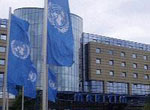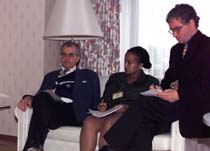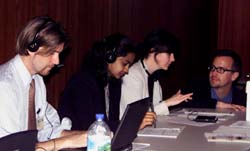Close of tenth sessions of the UNFCCC
subsidiary bodies
The tenth sessions of the UNFCCC subsidiary bodies ended Friday afternoon after
recommending a series of decisions for adoption at COP-5. After a slow start to the
two-week negotiations, punctuated by three bomb scares, momentum and productivity picked
up during the final three days after a series of G-77/China meetings to prepare internal
positions on the Kyoto Mechanisms, compliance and other issues. A senior European
negotiator reported a "growing interest among non Annex I Parties in the Kyoto
Mechanisms." Parties took a small step closer to agreeing a negotiating text on the
Mechanisms with an agreement to produce a new synthesis of Party positions in time for the
COP. Other key draft decisions deal with work on: national communications, methodological
issues related to land-use change, land-use and forestry, bunker fuels, adverse impacts
arising from measures to address climate change, the AIJ pilot phase, and the new biennium
budget.There was continuing concern
among NGOs and some delegations about the issue of land-use change, land-use and forestry.
Negotiators in Bonn agreed a work programme, taking account of the upcoming IPCC report on
the issue. Greenpeace International has just published a new analysis of potential
loopholes in the Kyoto Protocol. Their senior climate change policy spokesperson, Bill
Hare, said the new analysis indicates that the proposals on the table at Bonn could
completely undermine its already limited environmental effectiveness: "Greenpeace has
now recalculated the potential loopholes in the Kyoto Protocol and they equal or exceed
the reduction requirements of the Protocol, representing a potentially fundamental breach
of the environmental integrity of the Kyoto Protocol." Revised official projections
for emissions in 2010 show that the Annex B group as a whole are likely to be 8% above
1990 levels.
|
